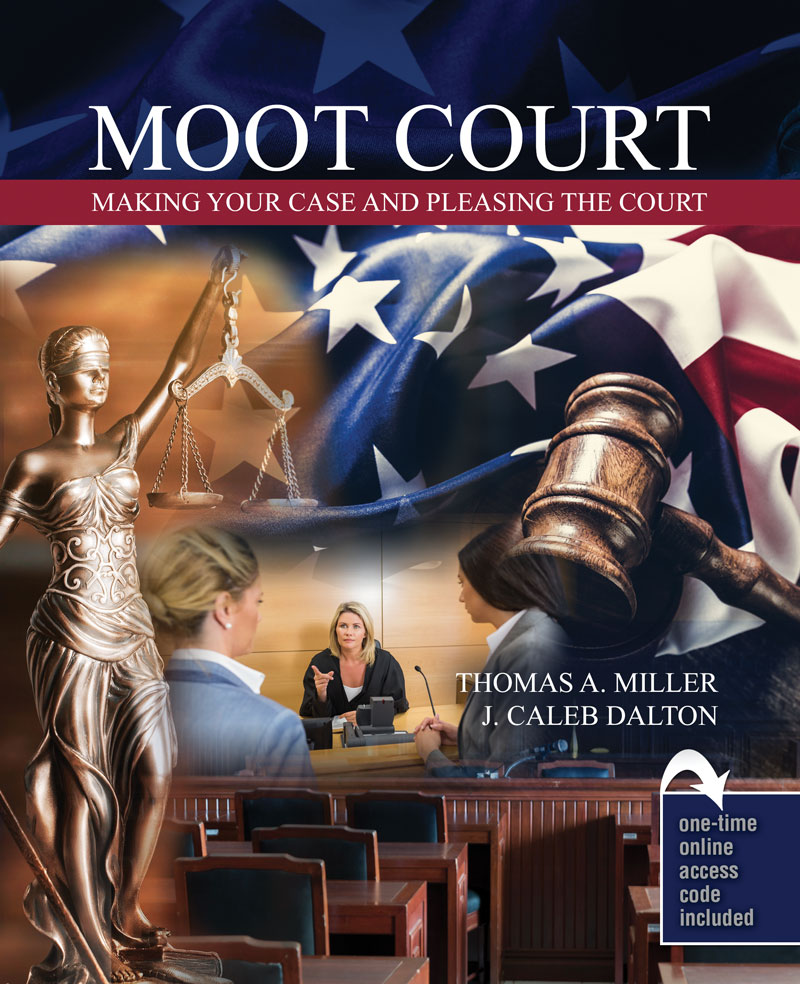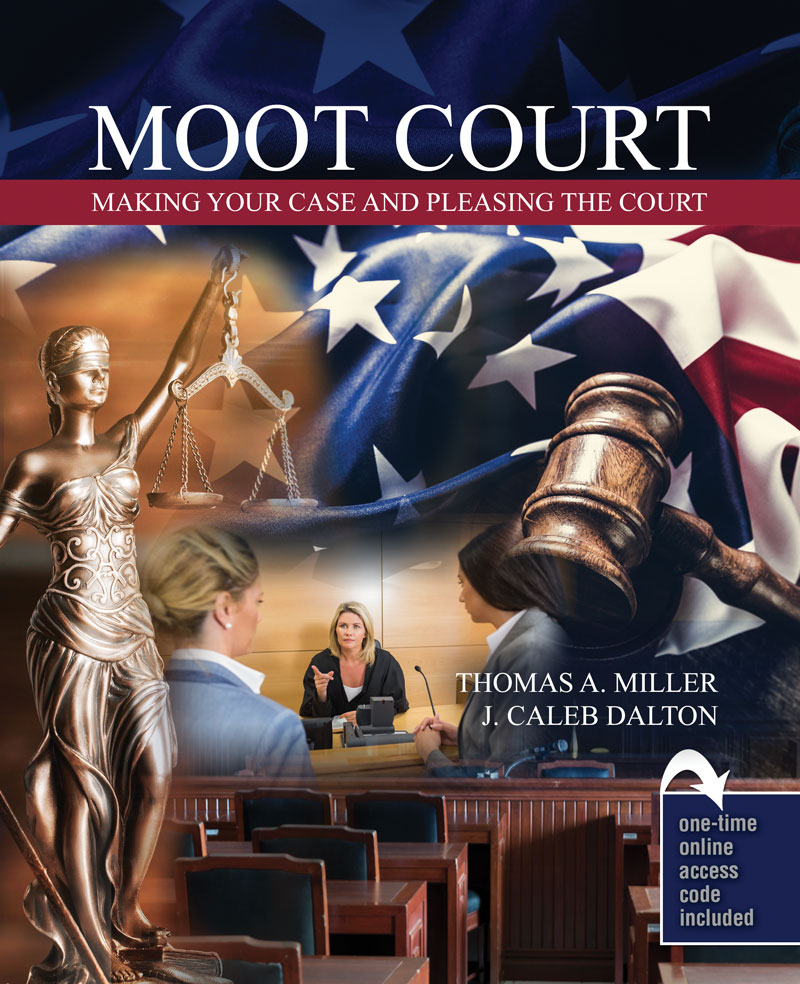Moot Court: Making Your Case & Pleasing the Court
Author(s): Thomas A. Miller , JONATHAN CALEB DALTON
Edition: 1
Copyright: 2019
Edition: 1
Copyright: 2019
Whether one participates for a semester, a year, or through your entire collegiate or high school experience, the skills honed as a moot courter will increase their ability to analyze situations, understand diverse viewpoints, and persuasively present their positions to others.
Based on the authors’ experience and success in moot court competitions, Moot Court: Making Your Case and Pleasing the Court prepares readers for intercollegiate or intramural moot court competition where teams on both sides of a lawsuit present their case via written and oral argument to a panel of justices.
Moot Court gives readers a high-level overview of moot court, legal reasoning in appellate cases, strategies to read a moot court problem, insight into writing the brief, and instruction on crafting a successful oral argument.
Moot Court includes an online video recording tool designed to provide feedback to help students analyze their oral arguments. In addition, learning outcomes, key terms, real-world examples, tips boxes, cases, references, and overviews are included throughout the publication.
Chapter 1: What is Moot Court?
1. Introduction to Appellate Cases
2. Moot Court Competition Format
3. Distinctions Between Moot Court and Mock Trial or Debate
Chapter 2: Legal Reasoning in Appellate Cases
1. Sources of Law
2. Standards of Review
3. Levels of Scrutiny
4. Gateway Tests
5. Other Constitutional Standards
6. Arguments Outside of Caselaw
Chapter 3: How to Read a Moot Court Problem
1. Reading the Facts of the Case
2. Reading the Caselaw
3. Issue Identification
Chapter 4: The Brief
1. Before You Write, Prepare
2. Use Each Substantive Section of a Brief as an Opportunity to Persuade
Chapter 5: Oral Argument
1. Preparation and Presentation – How to Prepare for an Oral Argument
2. The Opening
3. The Argument Itself
4. Use of Judges’ Questions
5. Conclusion / Prayer for Relief
6. Special Issues Facing Petitioner’s Counsel
7. Special Issues Facing Respondent’s Counsel
8. Courtroom Decorum
9. Miscellaneous Issues and Dealing with the Unexpected
After several semesters as an adjunct instructor Tom Miller joined the faculty of Western Connecticut State University as a one-year special appointment professor in 2016, just seven years removed from his own graduation from Western Connecticut with a degree in Justice & Law Administration. In January 2018 he was awarded a full-time tenure track position as an Assistant Professor. He graduated summa cum laude from Western Connecticut State University in 2009 and in 2012 he graduated cum laude from the Regent University School of Law. While attending Regent, Professor Miller had the honor to serve on the editorial board of the Regent University Law Review. During law school he also served as a law clerk for the United States Senate Committee on the Judiciary.
Prior to establishing the Law Offices of Thomas Miller LLC, Professor Miller served as a temporary assistant clerk for Stamford Superior Court. While working for the court Professor Miller played a hands-on role in the management of more than a thousand cases in addition to editing and reviewing judicial decisions.
Professor Miller teaches a variety of courses including Commercial Law, Legal Writing, Constitutional Law, and Moot Court. Professor Miller also serves as the Director of the University’s Moot Court Program. In 2015, he received the “Outstanding Faculty Member” Award for WCSU’s Ancell School of Business, and is the only adjunct professor in any discipline at WCSU to earn this designation.
Professor Miller is admitted to practice in both state and federal courts in Connecticut where he has been extensively engaged in civil and commercial litigation matters, business formation, contract review, property transactions and tort litigation. He also serves as a State of Connecticut Justice of the Peace.
Caleb Dalton is a civil rights litigator with a national practice focused primarily on defending the freedoms protected by the First and Fourteenth Amendments. He has been appointed as Special Assistant Attorney General of Arizona on multiple occasions to represent state interests in federal and state courts and has practiced at every level of the federal judiciary. He has appeared on national television and radio networks, guest lectured on constitutional law, and coached successful moot court and debate teams.
While in college, Dalton won national championships in crossfire debate and moot court brief writing competitions. He graduated with a BA in public policy from Patrick Henry College and interned in the U.S. Senate. He earned his juris doctorate, cum laude, from Regent University School of Law where he served with Tom Miller on the Law Review Editorial Board, as well as serving on the Trial Advocacy Board, and externing with the U.S. Attorney’s Office. He is admitted to the bars of the Commonwealth of Virginia, the State of Arizona, and the District of Columbia. He is also admitted to the bar of the Supreme Court of the United States as well as multiple federal appellate and district courts.
Whether one participates for a semester, a year, or through your entire collegiate or high school experience, the skills honed as a moot courter will increase their ability to analyze situations, understand diverse viewpoints, and persuasively present their positions to others.
Based on the authors’ experience and success in moot court competitions, Moot Court: Making Your Case and Pleasing the Court prepares readers for intercollegiate or intramural moot court competition where teams on both sides of a lawsuit present their case via written and oral argument to a panel of justices.
Moot Court gives readers a high-level overview of moot court, legal reasoning in appellate cases, strategies to read a moot court problem, insight into writing the brief, and instruction on crafting a successful oral argument.
Moot Court includes an online video recording tool designed to provide feedback to help students analyze their oral arguments. In addition, learning outcomes, key terms, real-world examples, tips boxes, cases, references, and overviews are included throughout the publication.
Chapter 1: What is Moot Court?
1. Introduction to Appellate Cases
2. Moot Court Competition Format
3. Distinctions Between Moot Court and Mock Trial or Debate
Chapter 2: Legal Reasoning in Appellate Cases
1. Sources of Law
2. Standards of Review
3. Levels of Scrutiny
4. Gateway Tests
5. Other Constitutional Standards
6. Arguments Outside of Caselaw
Chapter 3: How to Read a Moot Court Problem
1. Reading the Facts of the Case
2. Reading the Caselaw
3. Issue Identification
Chapter 4: The Brief
1. Before You Write, Prepare
2. Use Each Substantive Section of a Brief as an Opportunity to Persuade
Chapter 5: Oral Argument
1. Preparation and Presentation – How to Prepare for an Oral Argument
2. The Opening
3. The Argument Itself
4. Use of Judges’ Questions
5. Conclusion / Prayer for Relief
6. Special Issues Facing Petitioner’s Counsel
7. Special Issues Facing Respondent’s Counsel
8. Courtroom Decorum
9. Miscellaneous Issues and Dealing with the Unexpected
After several semesters as an adjunct instructor Tom Miller joined the faculty of Western Connecticut State University as a one-year special appointment professor in 2016, just seven years removed from his own graduation from Western Connecticut with a degree in Justice & Law Administration. In January 2018 he was awarded a full-time tenure track position as an Assistant Professor. He graduated summa cum laude from Western Connecticut State University in 2009 and in 2012 he graduated cum laude from the Regent University School of Law. While attending Regent, Professor Miller had the honor to serve on the editorial board of the Regent University Law Review. During law school he also served as a law clerk for the United States Senate Committee on the Judiciary.
Prior to establishing the Law Offices of Thomas Miller LLC, Professor Miller served as a temporary assistant clerk for Stamford Superior Court. While working for the court Professor Miller played a hands-on role in the management of more than a thousand cases in addition to editing and reviewing judicial decisions.
Professor Miller teaches a variety of courses including Commercial Law, Legal Writing, Constitutional Law, and Moot Court. Professor Miller also serves as the Director of the University’s Moot Court Program. In 2015, he received the “Outstanding Faculty Member” Award for WCSU’s Ancell School of Business, and is the only adjunct professor in any discipline at WCSU to earn this designation.
Professor Miller is admitted to practice in both state and federal courts in Connecticut where he has been extensively engaged in civil and commercial litigation matters, business formation, contract review, property transactions and tort litigation. He also serves as a State of Connecticut Justice of the Peace.
Caleb Dalton is a civil rights litigator with a national practice focused primarily on defending the freedoms protected by the First and Fourteenth Amendments. He has been appointed as Special Assistant Attorney General of Arizona on multiple occasions to represent state interests in federal and state courts and has practiced at every level of the federal judiciary. He has appeared on national television and radio networks, guest lectured on constitutional law, and coached successful moot court and debate teams.
While in college, Dalton won national championships in crossfire debate and moot court brief writing competitions. He graduated with a BA in public policy from Patrick Henry College and interned in the U.S. Senate. He earned his juris doctorate, cum laude, from Regent University School of Law where he served with Tom Miller on the Law Review Editorial Board, as well as serving on the Trial Advocacy Board, and externing with the U.S. Attorney’s Office. He is admitted to the bars of the Commonwealth of Virginia, the State of Arizona, and the District of Columbia. He is also admitted to the bar of the Supreme Court of the United States as well as multiple federal appellate and district courts.

